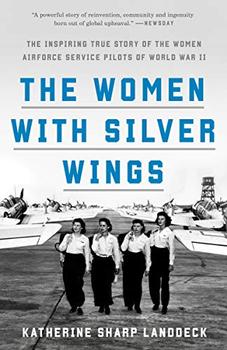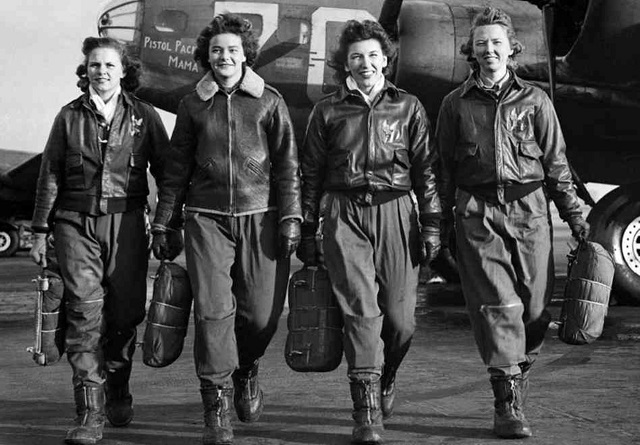Summary | Excerpt | Reading Guide | Reviews | Beyond the Book | Read-Alikes | Genres & Themes | Author Bio

The Inspiring True Story of the Women Airforce Service Pilots of World War II
by Katherine Sharp LanddeckThis article relates to The Women with Silver Wings
 Katherine Sharp Landdeck's The Women with Silver Wings chronicles the experiences of the Women Airforce Service Pilots (WASPs) that flew planes across the U.S. during World War II, bringing aircraft and supplies to military bases and even training male pilots that would later fly in combat. They also tested out new bomber planes when the male Air Force members refused, judging these assignments to be too dangerous. Yet when the war was over, these brave women were not granted the recognition and respect they deserved for their service. Because they were not official members of the military, they were not granted veteran status, not at the time of the war and not for decades after. Thirty-eight WASPs died in service and these women were not given the traditional benefits provided by the U.S. military to its members, which would have included the transportation of the deceased home to their family and the payment of funeral costs. Instead, the WASPs raised money among themselves to help the families of their fallen sisters with these expenses. When the war ended, limited career options were available to the WASPs, as the U.S. Air Force did not permit women to fly planes under non-war time circumstances. Some stayed on at the Air Force in administrative roles, others became flight instructors and stewardesses, and many left aviation to have families or pursue different goals.
Katherine Sharp Landdeck's The Women with Silver Wings chronicles the experiences of the Women Airforce Service Pilots (WASPs) that flew planes across the U.S. during World War II, bringing aircraft and supplies to military bases and even training male pilots that would later fly in combat. They also tested out new bomber planes when the male Air Force members refused, judging these assignments to be too dangerous. Yet when the war was over, these brave women were not granted the recognition and respect they deserved for their service. Because they were not official members of the military, they were not granted veteran status, not at the time of the war and not for decades after. Thirty-eight WASPs died in service and these women were not given the traditional benefits provided by the U.S. military to its members, which would have included the transportation of the deceased home to their family and the payment of funeral costs. Instead, the WASPs raised money among themselves to help the families of their fallen sisters with these expenses. When the war ended, limited career options were available to the WASPs, as the U.S. Air Force did not permit women to fly planes under non-war time circumstances. Some stayed on at the Air Force in administrative roles, others became flight instructors and stewardesses, and many left aviation to have families or pursue different goals.
It was not until 1977 (one year after the Air Force started accepting women into the pilot program again) that the WASPs were officially granted veteran status by Public Law 95-202, signed by President Carter. (In 2009, President Obama bestowed the entire WASP force with Congressional Gold Medals, but this is an honor for civilians rather than military.) Despite the passing of Public Law 95-202, WASPs were still not provided with all of the benefits generally afforded to members of the military. When former WASP Elaine Harmon passed away in 2015, her family sought to have her ashes interred at Arlington National Cemetery in accordance with her wishes. Because the WASPs were not technically a part of any service branch, the request was denied. Harmon's family launched a campaign to have the rules changed so her remains could be interred at Arlington. Their petition on Change.org received over 177,000 signatures.
Arizona House Representative Martha McSally, herself a former Air Force colonel, and co-sponsors introduced a bill in January 2016 to grant the WASPs the right to have their ashes interred at Arlington. After breezing through Congress, the bill was signed by President Obama in May, and Elaine Harmon's ashes were finally laid to rest there, complete with a military funeral, in September 2016.
Another WASP, Bernice "Bee" Haydu, devoted her life to gaining increased recognition for herself and the women with whom she served. After visiting the Smithsonian Air and Space Museum in 1969 and discovering they had nothing on display to represent the WASPs and their service, she became committed to rectifying this situation. She personally contacted Paul Garber, the head of the museum, and then began collecting memorabilia from the other former pilots. These items, including Haydu's own dress uniform, remain on display in the museum's companion facility, the Udvar-Hazy Center.
by Lisa Butts
World War II WASPs, courtesy of U.S. Department of Defense
Filed under People, Eras & Events
![]() This "beyond the book article" relates to The Women with Silver Wings. It originally ran in April 2020 and has been updated for the
March 2021 paperback edition.
Go to magazine.
This "beyond the book article" relates to The Women with Silver Wings. It originally ran in April 2020 and has been updated for the
March 2021 paperback edition.
Go to magazine.
Your guide toexceptional books
BookBrowse seeks out and recommends the best in contemporary fiction and nonfiction—books that not only engage and entertain but also deepen our understanding of ourselves and the world around us.